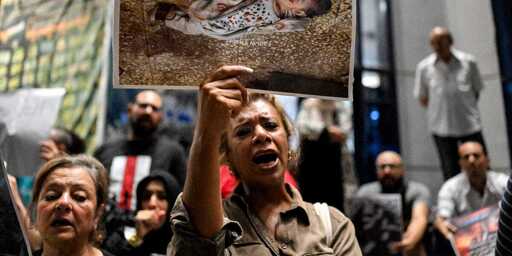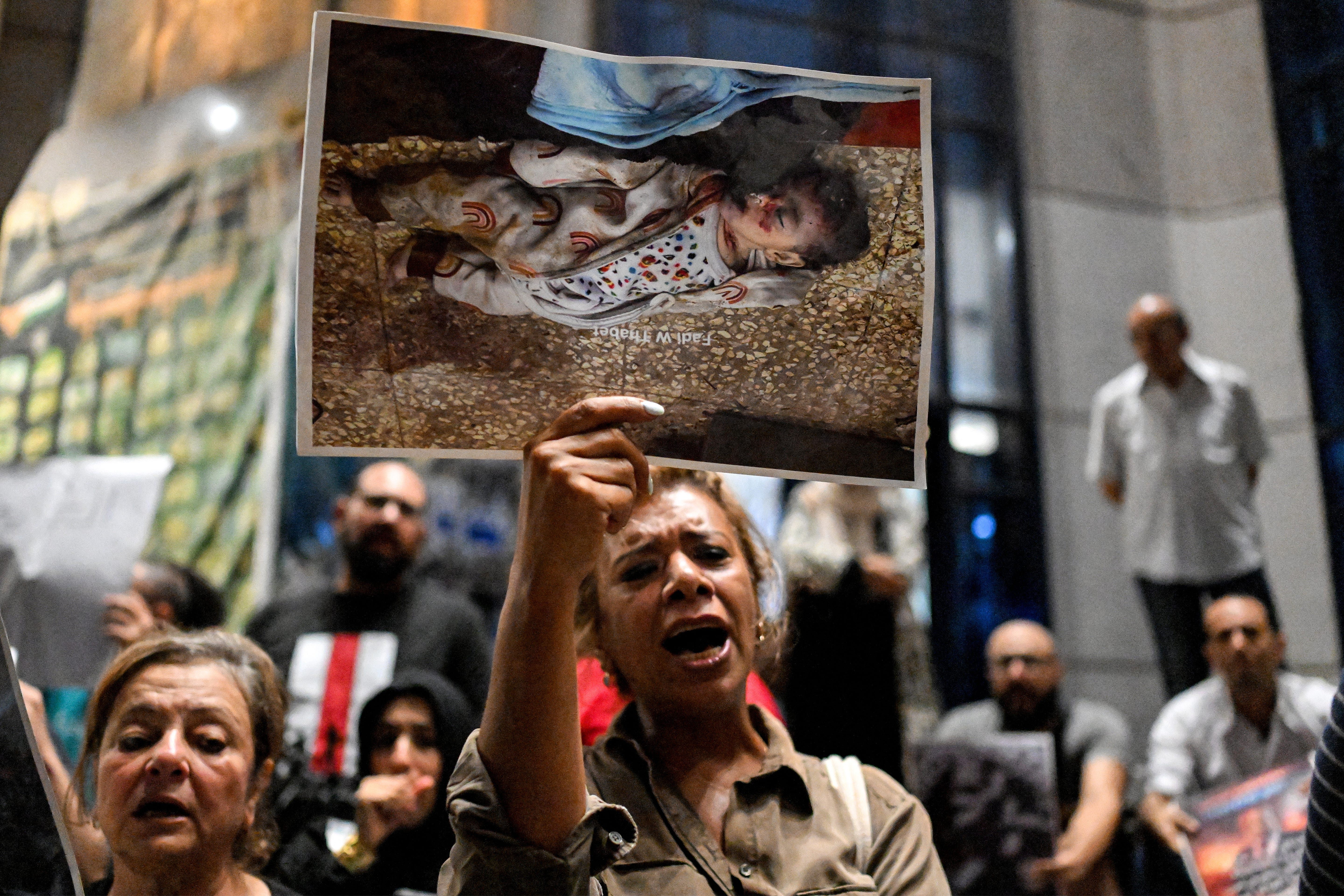We have a commitment to ensuring that our journalism is not locked behind a paywall. But the only way we can sustain this is through the voluntary support of our community of readers. If you are a free subscriber and you support our work, please consider upgrading to a paid subscription or gifting one to a friend or family member. You can also make a 501©(3) tax-deductible donation to support our work. If you do not have the means to support our work financially, you can do your part by sharing our work on social media and by forwarding this email to your network of contacts.
A demonstrator holds a picture of a killed Palestinian child as she chants slogans during a protest in solidarity with journalists in the Gaza Strip organized by journalists outside Egypt’s Press Syndicate in Cairo on August 13, 2025. (Photo by KHALED DESOUKI/AFP via Getty Images.)
Story by Mostafa Amin
CAIRO, EGYPT—On September 7, Hossam Mahmoud, the media spokesperson for the Egyptian Sumoud Flotilla, was making final preparations for a press conference the next day when he received a phone call from an unknown number. The group, made up of volunteer activists and representatives of political parties and movements, had been organizing to join over 40 boats from the Global Sumoud Flotilla (GSF) that was sailing in the Mediterranean toward the Gaza Strip to break Israel’s siege on the enclave. Egypt’s participation in the GSF would have been symbolically powerful: citizens from the only country sharing a border with Gaza other than Israel sending a vessel of their own.
Yet the voice on the other end of the phone was unequivocal: anyone who showed up to the press conference—activists, journalists, lawyers—risked arrest. The flotilla organizers had no choice but to cancel the next day’s event.
“The pressure was enormous,” Mahmoud told Drop Site. “We had applied for approval to sail and received no official response—neither acceptance nor rejection. Then, the day before our press conference, the authorities warned that everyone present, including journalists, could be arrested.”
Despite ongoing government threats and intimidation, the organizing committee continued preparations for the Egyptian flotilla to set sail and link up with the GSF as they neared Egypt’s coastline. On September 21, the owner of the boat vanished—disappeared by Egypt’s security forces. A little over a week later, on September 29, three members of the flotilla committee were arrested near their headquarters in Cairo and held in an undisclosed location until their release this past Monday.
The flotilla episode revealed a pattern familiar to Egyptian activists: silence, then intimidation, then disappearance. “There is an invisible red line that no one can cross,” Mahmoud said. “And that line keeps moving closer every day.”
The incidents are only the latest in a wider crackdown by Egyptian authorities on actions or expressions of solidarity with Palestine. Over 150 people are currently detained in Egypt for demonstrating, organizing, or even donating to support Palestine since Israel began its genocidal assault on Gaza a little over two years ago, according to the Egyptian Initiative for Personal Rights (EIPR).
Egypt shares Gaza’s only non-Israeli border. Its army controls the Rafah crossing—once a lifeline for food, fuel, medicine, and other humanitarian aid to Gaza. Yet despite Egypt’s proximity and historical ties to the Palestinian cause, the country has seen only small and muted expressions of protest against Israel or in solidarity with Gaza. While hundreds of thousands have protested in cities across the globe for Palestine—from New York to London to Rome Algiers to Buenos Aires to Tokyo—the streets of Egypt have remained largely silent save for a few public demonstrations carefully managed by the state.
Since Abdel Fattah al-Sisi came to power in Egypt in 2013, shedding his military uniform to run for president a year later, the country has entered one of the most repressive political orders in its modern history. Dissent is not tolerated, opposition voices are silenced, and tens of thousands of political prisoners are behind bars.
On the issue of Palestine in particular, activists, lawyers, and analysts interviewed by Drop Site say Egyptian authorities worry that protests against Israel could quickly broaden into protests against the Egyptian government.
There is precedent. After years of political stagnation in the 1990s, a grassroots protest movement in Egypt first began to organize around regional issues. With the start of the Second Palestinian Intifada in 2000, tens of thousands joined street demonstrations in cities across Egypt to protest against Israel, as well as Arab governments, including a mass mobilization in Cairo’s iconic Tahrir square. In 2003, mass demonstrations were again held in Tahrir to protest the U.S. invasion of Iraq. Those movements eventually began organizing around domestic issues that helped ignite the 2011 revolution that toppled President Hosni Mubarak after 30 years in power.
Peacemaker on the World Stage, Repression at Home
Egypt took center stage last weekend when it co-hosted a “Peace Summit” with the U.S. where nearly 30 world leaders gathered in Sharm El-Sheikh to consolidate the initial phase of a ceasefire in Gaza that went into effect on October 10. Sisi held a bilateral meeting with U.S. President Donald Trump ahead of the official inauguration of the summit, during which Trump called Sisi a “powerful man, very powerful,” and appeared to openly praise Sisi’s heavy handed security approach to domestic issues. “The president, but also the general… Usually I call him the general because he’s both, and he’s good at both,” Trump told reporters in reference to Sisi who was standing beside him. “They’ve done a fantastic job, and they have very little crime, you know. Because they don’t play games. That’s why.”
Over the past two years, Sisi has carefully managed widespread public anger over Israel’s war on Gaza in parallel with Egypt’s close ties to the U.S. and Israel. In public statements, the Egyptian government has cited support for the Palestinian cause and international law.
Less than two weeks after Israel launched its genocidal assault on Gaza, on October 20, 2023, state-aligned political parties and groups called for marches in solidarity with Palestinians. Crowds poured out of mosques after Friday prayers in Cairo, Alexandria, and cities across the country. In the capital, marchers reached Tahrir square, the symbolic heart of the 2011 revolution.
“People started shouting ‘Bread, Freedom, Social Justice,’” recalled Ahmed Douma, a prominent activist and key figure of the 2011 uprising who was released from prison in August 2023 after a decade behind bars. “Suddenly the slogans were not only for Gaza, but against the regime itself.”
What had begun as a state-managed demonstration for Gaza had grown into an anti-government protest, prompting security forces to respond with overwhelming force. Riot police stormed the square using batons and tear gas to disperse demonstrators. Dozens were arrested, according to human rights groups. Two years later, at least 120 remain in pretrial detention on charges of “spreading false news” and “joining an illegal gathering.” No major demonstrations have been held in Egypt since.
Lawyers with EIPR told Drop Site that dozens of others have been arrested for social media activity expressing solidarity with Gaza. “People have been detained for sharing a post or changing their profile photo to the Palestinian flag,” said a defense attorney who asked to remain anonymous for security reasons. “It’s enough to accuse someone of belonging to a terrorist organization.”
In one case, two minors from Cairo’s Dar al-Salam district were detained in March 2024 after painting graffiti reading “Free Gaza.” They remain behind bars today, held in a prison for adults in pretrial detention on charges of “spreading false information.”
“This is a regime that survives on control,” said a Cairo-based political scientist who was briefly detained at a small pro-Palestine demonstration in October 2023 and requested anonymity for security reasons. “They know that any protest, no matter how symbolic, can turn into something larger—just as it did in 2011. Gaza is an emotional issue for Egyptians; it can awaken old revolutionary energy.”
In June, hundreds of international activists arrived in Egypt to take part in a planned march to the Rafah border crossing and call for an end to Israel’s siege of Gaza. The grassroots movement, called the Global March to Gaza, made repeated requests for permission at Egyptian embassies abroad in the days and weeks leading up to the planned action to cross into Sinai and gather in al-Arish for the march. Yet Egyptian authorities refused, and participants from 80 countries arriving in Cairo were instead subject to hotel raids, harassment, arrests, and deportations.
“The government cited security reasons,” said a foreign participant who requested anonymity. “But it was clear they wanted to prevent even the image of mass mobilization for Gaza on Egyptian soil.”
The crackdown on local and international solidarity efforts reveals what analysts describe as Egypt’s sensitive role: an ally of Israel, a mediator with Hamas, and a self-appointed gatekeeper for aid entering Gaza.
“Cairo has positioned itself as the indispensable mediator between Hamas, Israel, and the West,” said Timothy E. Kaldas, deputy director of the Tahrir Institute for Middle East Policy. “Allowing public protests or independent initiatives like the flotilla would undermine that narrative and risk showing the world that Egyptians reject their government’s complicity.”
Kaldas noted that Egypt’s state-affiliated companies, such as Al-Argany Group, have become the main conduits for humanitarian convoys to Gaza. “This monopolizes aid under government control,” he said. “Independent relief or grassroots actions are seen as threats—not to national security, but to political authority.”
Before Israel invaded Rafah in May 2024 and effectively closed down the Rafah border crossing, Palestinians seeking to flee the war in Gaza by crossing the Rafah border into Egypt were forced to pay thousands of dollars per person to Hala Consulting, an Egyptian travel agency owned by Ibrahim Al-Argany that “has strong links with Egypt’s security establishment and is staffed largely by former Egyptian military officers,” according to Human Rights Watch.
Drop Site News is reader-supported. Consider becoming a free or paid subscriber.
Increasing Repression Abroad
Since 2007, Egypt has been complicit in Israel’s siege of Gaza, helping to enforce the blockade and restrict the movement of goods and people to the enclave. When the war began in October 2023 and Israel severely tightened the siege—cutting off all aid entirely at times—the Egyptian government publicly called on Israel to admit humanitarian aid, yet it did little more to press the issue, despite hundreds of aid trucks idling on the Egyptian side of the Rafah border crossing.
The lack of action at Rafah has sparked protests over the past year outside Egyptian embassies in at least 27 countries, including the UK, Germany, Turkey, and the United States.
In July, Anas Habib, a young Egyptian citizen living in the Netherlands, chained shut the gates of the Egyptian embassy in Amsterdam to protest the Rafah crossing closure. His symbolic act spread quickly, and activists replicated it in Berlin, London, and New York under the slogans “The Revolution Continues” and “Rafah is Closed for Them, Not for Us.”
But the movement was soon met with an organized counter-campaign. Members of a pro-government diaspora group called the Egyptian Youth Union Abroad—including Ahmed Qader “Mido” and Ahmed Nasser Dabbaba—confronted protesters at several embassies, labeling them “traitors” and “Muslim Brotherhood agents.” Videos circulating on social media show the men threatening demonstrators and journalists.
Habib told Drop Site News he has no Muslim Brotherhood connections. “I was never affiliated with any political group. And my actions against the Egyptian government is purely out of resentment to its complicity in the genocide in Gaza.”
In London, tensions escalated when Mido was arrested on suspicion of carrying a knife after allegedly assaulting journalist Basma Mostafa and two Egyptian activists. Dabbaba was also briefly detained and released. The incident drew media attention when leaked audio, allegedly from Egypt’s foreign minister, appeared to urge embassies to “defend themselves by any means necessary” against anti-government protesters.
Kaldas called these incidents “an unprecedented extension of repression beyond Egypt’s borders.” He added that “for the first time, Egyptian diplomats are directly involved in acts of intimidation and violence abroad. It’s an inappropriate use of diplomatic privilege, and a sign of how insecure the regime has become.”
In one case, two Egyptian-American teenagers were briefly abducted outside Egypt’s consulate in New York and pulled inside the building, in what Kaldas described as “a breach of international law.” Both were later released after pressure from U.S. authorities.
For Seifeldin Islam, an Egyptian activist and researcher now based in Qatar who participated in protests outside Egypt’s London embassy mid-2025, the government’s behavior reflects “a moral dilemma.”
“This regime wants to appear supportive of Palestinians, while crushing any form of Egyptian solidarity,” he told Drop Site. “It cannot allow citizens to express emotion or conscience, because that could evolve into political criticism.”
Seifeldin helped track the spread of protests at Egyptian embassies worldwide. He says there was no central coordination. “It was like a snowball. One act inspired another. People acted spontaneously, because they felt powerless watching Gaza burn while their own government enforced the blockade.”
Seifeldin fled Egypt in 2015 after years of police harassment. “Every activist receives calls, threats, or investigations,” he said. “That’s why we can’t organize inside Egypt anymore. The repression doesn’t stop at the border; it follows us abroad.”
Indefinite Detention for Thousands of Egyptian Political Prisoners
President Trump and other world leaders have praised Egypt as a regional peace broker, despite Egyptian authorities locking up citizens inside the country for acts of solidarity with Gaza as well as threatening citizens abroad who are engaged in protest.
“The regime uses the Palestinian issue to polish its image internationally,” said Kaldas. “But inside Egypt, it cannot tolerate any independent mobilization. Every chant, every banner, is treated as a potential revolution.” He added, “Most Egyptians fear that joining a protest for Gaza could mean vanishing into the system—held in pretrial detention that can drag on for years without trial or release.”
Thousands of political prisoners are being held in Egypt in pretrial detention without ever having been convicted of a crime, a practice widely condemned by human rights groups. In August, the UN High Commissioner for Human Rights Volker Türk condemned Egypt’s widespread use of a practice known as “rotation”, whereby authorities bring fresh charges against individuals as they near the end of the maximum two-year period of pretrial detention—resetting the pretrial detention clock and holding people behind bars indefinitely.
By some counts, there are more than 60,000 political prisoners behind bars, including thousands held in pretrial detention. Between 2018 and 2021, monitoring groups recorded 941 rotations affecting 774 individuals—some rotated up to seven times. In December 2024 alone, the State Security Prosecution rotated 88 detainees into new cases, restarting the clock on their detention.
Two years after the war began, Egypt’s state-controlled TV channels continue broadcasting humanitarian appeals for Gaza while avoiding any mention of domestic repression against pro-Palestine protests or expressions.
“Gaza used to unite Egyptians,” said Douma. “Now it only reminds them of what they’ve lost—the right to speak, to gather, to demand anything.”
From Drop Site News via this RSS feed



